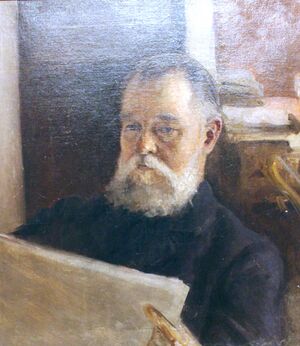Pyotr Jurgenson

Principal music publisher and friend of the composer (b. 5/17 July 1836 in Reval [now Tallinn, Estonia]; d. 20 December 1903/2 January 1904 in Moscow), born Pyotr Ivanovich Yurgenson (Пётр Иванович Юргенсон).
Biography
The son of Jögen Kirs Jurgenson, the captain of a fishing vessel, and his wife Aeta, Pyotr Jurgenson was born and educated in Reval. In 1850 he moved to Saint Petersburg, where he first worked as a salesman for the music sellers A. Bitner (1850–1855), and then became a music engraver for F. T. Stellovsky (1855–1859), before being appointed manager of the Schildbach brothers' publishing firm (1859–1861). In 1861, he became involved with the Moscow branch of the Russian Musical Society (later becoming one of its directors). On 10/22 August that year, Jurgenson opened his own music-publishing business on the corner of Dmitry the Great (Большая Дмтировка) and Stoleshnikova boulevard (Столешникова переулке).
Tchaikovsky and Jurgenson
In 1867 Jurgenson acquired his own printing works, and that same year he published Tchaikovsky's "Opus 1" (Scherzo à la russe and Impromptu), and so began a long-standing business relationship and close friendship.
At the start of Tchaikovsky's fledgling career, Jurgenson provided invaluable financial assistance by giving him various commissions, such as piano transcriptions and orchestral arrangements of works by other authors, and translations of musical texts. His willingness to publish all Tchaikovsky's works, sometimes running considerable financial risks in the process, earned the composer's loyalty. Although some of Tchaikovsky's compositions from the 1870s were published by other firms (such as Bessel, and Bernard), by the end of the decade Jurgenson had acquired the rights to publish Tchaikovsky's works not only in Russia, but in the rest of the world as well.
This was facilitated by a growing number of overseas agents, such as Sennewald (Warsaw), Mackar (Paris), Rahter (Hamburg) and Forberg (Leipzig). Meanwhile his older brother Osip Jurgenson (1829–1910) had taken over Stellovsky's firm in Saint Petersburg, and was acting as distributor in the Imperial capital. Pyotr Jurgenson took over at least 17 smaller firms between 1870 and 1903, including Bernard (1885), Maykov (1889) and Sokolov (1896), and the business rapidly became the largest in Russia. In 1880, the firm moved to new premises at 14 Neglinny prospekt (Неглинний проспект), and the following year Jurgenson purchased a house in Khokhlovsky boulevard (Хохловский переулок), to which in 1895 a three-storey music printing factory was added.
As well as managing Tchaikovsky's business affairs, Jurgenson also acted as intermediary in the wake of the composer's failed marriage to Antonina Milyukova. Jurgenson also recognised the importance of preserving the manuscripts of Tchaikovsky's works, and continued to issue new editions after the composer's death in 1893. However, relations with the composer's brother and heir Modest Tchaikovsky were not always easy, and the latter commissioned Jurgenson's rival Belyayev to publish those unfinished works of Tchaikovsky's that had been completed by Sergey Taneyev.
After Jurgenson's death in Moscow on 20 December 1903/2 January 1904, the publishing firm was taken over by his sons, Boris (1868–1935) and Grigory (1872–1936). Following the revolution of 1917, Jurgenson's firm was nationalised, and the following year it became the music section of the Soviet State Publishing House (Государственное музыкальное издательство), also known as Narkompros (Наркомпрос), Muzgiz (Музгиз), or Muzyka (Музыка).
In 2004, a new publishing house bearing the name "P. Jurgenson" was established in Moscow, as a successor to the original firm. Their publications included the Thematic and Bibliographical Catalogue of P. I. Čajkovskij's Works (2006).
Dedications
In 1869, Tchaikovsky dedicated his song A Tear Trembles — No. 4 of the Six Romances, Op. 6 — "to Pyotr Ivanovich Jurgenson".
Correspondence with Tchaikovsky
Bibliography
- У Юргенсона (1893)
- П. И. Юргенсон. Биографический набросок (1904)
- Неопубликованное письмо П. И. Чайковского (1928)
- Разговор с Чайковским (1938)
- П. И. Чайковский. Переписка с П. И. Юргенсоном, том 1 (1938)
- П. И. Чайковский. Переписка с П. И. Юргенсоном, том 2 (1952)
- П. И. Чайковский в семье П. И. Юргенсона (1973)
- П. И. Чайковский в семье П. И. Юргенсона (1979)
- П. И. Чайковский в семье П. И. Юргенсона (1980)
- Династия из дома на Неглинной (1990)
- Alexandra Jurgenson (1993)
- Bisher unbekannte Briefe und musikalische Arbeiten Čajkovskijs (1994)
- Ein Interview aus Anlass des Ablebens von Peter Tschaikowsky für den Korrespondenten der Peterburgskaja Gazeta (1994)
- Drei bisher unbekannte Briefe Čajkovskijs von 1887, 1891 und 1893, sowie sechs weitere Briefe vom 20. August 1893 (1995)
- В издательстве П. И. Юргенсона. К истории прижизненных изданний оперы Чайковского Евгений Онегин (2003)
- П. И. Юргенсон—издатель камерно-инструментальных ансамблей П. И. Чайковского (2011)
- П. И. Чайковский — П. И. Юргенсон. Переписка в двух томах, том 1 (2011)
- Бортнянский, Чайковский & Юргенсон (2013)
- П. И. Чайковский — П. И. Юргенсон. Переписка, том 2 (2013)
- Chaikovsky and the Economics of Art Music in Late Nineteenth-Century Russia (2019)
